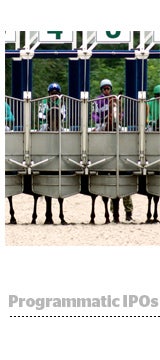 By Kelly Liyakasa, John Ebbert, and Zach Rodgers
By Kelly Liyakasa, John Ebbert, and Zach Rodgers
It’s a big week for the “programmatic IPO.” Rocket Fuel begins trading publicly tomorrow on NASDAQ under the ticker FUEL. French retargeter Criteo meanwhile has filed its F-1, with detailed information about its financials.
Since the performance of these two IPOs could set the tone for ad tech deal activity for months to come, we asked sources to compare “FUEL” and “CRTO” as businesses with an eye on their newly public financials.
Most agreed Criteo and Rocket Fuel have more commonalities than differences. Both are good examples of “ad network 2.0″ businesses – a step up from the low-value publisher network model. And both depend for their revenue on the opaque arbitrage pricing tactics and insertion order-based selling associated with ad networks.
According to Mike Baker, CEO of DataXu, “Both companies have done a good job making ad network business models work, despite the very real challenge of gross margin pressure on the underlying media arbitrage.”
Baker is not the only one to note the gross margin concern. Gross margins are calculated as gross revenue minus traffic acquisition costs (TAC), divided by gross revenue. Criteo’s gross margin was 42% last year, according to its F1 filing, but only 40% so far in 2013. That could fall further this year, since inventory gets pricier in Q4.
Gross margin has the potential to crush ad network valuation, another source said. Rocket Fuel’s gross margin beats Criteo’s because it offers agency-like services in addition to an ad network (i.e. media markup) model.
Criteo has revenue sustainability, but future revenue is likely to come with higher TAC since the easy money of website retargeting is already being soaked up. Declining revenue growth – either gross or net – is something Wall Street won’t easily swallow. Criteo’s edge: It hooks into SKU data on the advertiser direct side.
Rocket Fuel faces similar issues around TAC. And it has high sales and marketing costs (about 70% of net revenues), a state of affairs another source called “kinda Groupon-esque.” Rocket Fuel’s edge: It offers DR and brand products for clients, and strong insights reporting.
Working in Criteo’s favor, and Rocket Fuel’s, is that programmatic technologies (automation, real-time bidding, use of data and algorithms) underlie each company’s media buying practices. Financial and research analysts are singing the praises of programmatic technologies, publishers are investing, and marketers are migrating spend. Twitter also appears to be playing the programmatic card in prepping for its IPO.
SaaS Storm Clouds
A long-term risk to both companies may lie in self-serve digital buying, where the marketer or its managed services contacts at a DSP-like company choose to transact media directly paying licensing fees.
According to Michael Greene, director of research at Audience Science and a former Forrester Research analyst, “Programmatic technology – with automated workflow and platform-based execution – has the opportunity to fundamentally alter the way advertisers buy media, making media budgets stretch further through greater efficiency, online today and on TV in the near future.”
But! Greene continued: “This won’t happen so long as programmatic technology is bought and sold in impressions and clicks, not as enterprise technology. What should excite Wall Street are technologies that fundamentally disrupt the conventional media buying value chain, just like Oracle and SAP did for finance, supply chain and operations in the past decades.”
He added, “We’ve seen marketing automation vendors create great value (and achieve substantial exits and valuations) by moving directly into the enterprise and creating new efficiencies for marketers.”
One glance at the broader enterprise vendor space suggests Ad Network 2.0 companies may soon find themselves competing more directly with SaaS heavy hitters. Cloud computing stalwart Salesforce.com, which proverbially began in CEO Marc Benioff’s San Francisco studio (or one-bedroom) apartment circa 1999, began first as a sales application that helped reps manage contacts and leads in the “golden” days of CRM.
Fast-forward and Salesforce.com is, today, driving into the marketing stack, having acquired email and digital marketing platform ExactTarget for $2.5 billion. Oracle’s $870 million acquisition of marketing and revenue management platform Eloqua points in the same direction. Neither company has bought a Demand Side Platform or Data Management Platform, yet.
For now, Criteo and Rocket Fuel are betting on their algorithms, exchange-based scale, and service orientation to help compete in an increasingly software-driven world.












